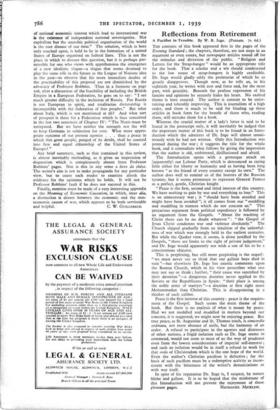Reflections from Retirement
A Pacifist in Trouble. By W. R. Inge. (Putnam. 75. 6d.) THE contents of this book appeared first in the pages of the Evening Standard ; the chapters, therefore, are not steps in an argument or even essays, but newspaper articles tossed off for the stimulus and diversion of the public. " Religion and Letters for the Strap-hanger " would be an appropriate title for the book. That a scholar and a wit should condescend to the low estate of strap-hangers is highly creditable. Dr. Inge would gladly edify the proletariat of which he so greatly disapproves. Though now, as he tells us, in his eightieth year, he writes with zest and force and, for the most part, with geniality. Beneath the profuse expression of his fancies and opinions he securely hides his heart. No exalted theme is here essayed. The author is content to be enter- taining and tolerably improving. This is journalism of a high order, and there is much to be said for binding up these articles in book form for the benefit of those who, reading them, will mistake them for a book.
Whereas the crucial matter of a lady's letter is said to be found in the postscript only, it will inevitably be judged that the important matter of this book is to be found in an Intro- duction which the admirers of Dr. Inge will almost unani- mously wish he had not written. Only this Introduction was penned during the war ; it suggests the title for the whole book, and it contradicts what follows by giving the impression that the author is old, embittered, disillusioned and afraid.
The Introduction opens with a grotesque attack on (apparently) our Labour Party, which is denounced as caring little either for liberty or humanity and as having been long known " as the friend of every country except its own." The author does well to remind us of the horrors of the Russian tyranny, but it seems premature to represent General Franco as a perfect, gentle, Christian knight.
" Peace is the first, second and third interest of this country. We have nothing to gain by war and everything to lose." This is an unnecessary war ; it "should have been avoided and might have been avoided "; it all comes from our " meddling and muddling in matters which do not concern us." This precarious argument from political expediency is followed by an argument from the Gospels. " About the teaching of Christ there can be no doubt whatever ": " the Gospel of Jesus Christ condemns war and violence absolutely." The Church slipped gradually from an intuition of the unlawful- ness of war which was strongly held in the earliest centuries. But while the Quaker view, it seems, is alone justified by the Gospels, " there are limits to the right of private judgement," and Dr. Inge would apparently not wish a son of his to be a conscientious objector.
This is perplexing, but still more perplexing is the sequel : " we must never say or think that our gallant boys died in vain "—but elsewhere Dr. Inge has caustic comments upon the Roman Church, which in his view prescribes what one may not say or think ; further, " their cause was sanctified by their devotion "—a dangerous doctrine never applied to the Soviets or the Republicans in Spain : " their place is among the noble army of martyrs "—a doctrine at first sight more Mohammedan than Christian. This is disappointing in a thinker of such calibre.
Peace is the first interest of this country : peace is the require- ment of the Gospel. Such seems the main theme of the book. But there is no analysis of what is meant by peace. Had we not meddled and muddled in matters beyond our concern, it is suggested, we might now be enjoying peace. But true peace, as St. Augustine and St. Thomas teach, is concordia ordinata, not mere absence of strife, but the harmony of an order. A refusal to participate in the agonies and distresses of other nations, a frigid isolation such as Dr. Inge seems to commend, would not seem to most of us the way of prudence even from the lowest considerations of imperial self-interest ; and such an isolation would be in itself a refusal to work for that ordo of Christendom which is the one hope of the world. Even the author's Christian pacifism is defective ; for the basis of such pacifism must be a redemptive activity as incon- sistent with the bitterness of the writer's denunciations as with war itself.
In spite of his reputation Dr. Inge is, I suspect, by nature blithe and gallant. It is to be hoped that the misfortune of this Introduction will not prevent the enjoyment of these












































 Previous page
Previous page